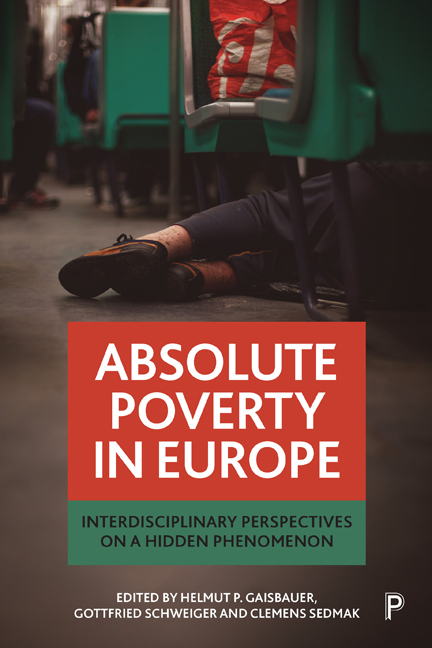Book contents
- Frontmatter
- Contents
- List of figures and tables
- Notes on contributors
- 1 Absolute poverty in Europe: introduction
- Part One Conceptual and methodological challenges
- Part Two Key issues for the absolute poor
- Part Three Policy responses to absolute poverty in Europe
- Part Four Ethical perspectives on absolute poverty in Europe
- Conclusion responding to the dark reality of absolute poverty in European welfare states
- Index
2 - Reconceptualising poverty in Europe: exclusion, marginality and absolute poverty reframed through participatory relational space
Published online by Cambridge University Press: 27 April 2022
- Frontmatter
- Contents
- List of figures and tables
- Notes on contributors
- 1 Absolute poverty in Europe: introduction
- Part One Conceptual and methodological challenges
- Part Two Key issues for the absolute poor
- Part Three Policy responses to absolute poverty in Europe
- Part Four Ethical perspectives on absolute poverty in Europe
- Conclusion responding to the dark reality of absolute poverty in European welfare states
- Index
Summary
Introduction
Poverty is a significant global issue. An affluent European Union has been unable to eliminate poverty despite having some of the richest countries in the world with welfare states providing institutional solidarity to support those on no or low incomes. Why is this so? I consider this question by arguing that contemporary poverty has become individualised and restricted conceptually to domestic relational space: that is, an individual managing to meet daily needs and routines on a limited income while disengaging from governance structures or public relational space where the decisions affecting the policies that govern what happens in both relational spaces are made. Exercising agency by asserting control over one's life constitutes political or participatory relational space and occurs in both domestic and public relational spaces. Responsibility for addressing societal levels of poverty rests with the nation state that is increasingly restricting its concerns to activating its nationals to rise out of poverty through paid work and restricting the human rights claims of non-nationals, including the right to migrate.
I reach that conclusion in this chapter by examining contemporary European poverty, exploring Peter Townsend's (1979) notions of universal and relative poverty and finding them insufficient for twenty-first century social relations. These two concepts have been popularised in policy circles as monetarised conditions configured around an individual not managing to live at subsistence levels, that is, subsistence poverty. Monetarisation ignores existential poverty, a structurally rooted condition wherein a nation state fails to guarantee an individual’s, family's or group's capacity to exercise citizenship or agency, develop their talents to the fullest extent, and make all decisions about their lives. I explore the conceptual limitations of absolute and relative poverty, reconceptualise poverty holistically within participatory relational space, expose its relational dimensions involving self-fulfilment, agency and realisation of welfare entitlements as universal human rights rather than a citizenship status applied only to nationals of a particular nation state. I conclude that eliminating contemporary poverty requires European nation states to tackle both structural and personal determinants of poverty by eliminating both subsistence poverty and existential poverty and providing the resources and governance structures that facilitate the realisation of their ‘duty of care’ to all those residing within their territorial borders, whether nationals or not.
- Type
- Chapter
- Information
- Absolute Poverty in EuropeInterdisciplinary Perspectives on a Hidden Phenomenon, pp. 17 - 38Publisher: Bristol University PressPrint publication year: 2019



